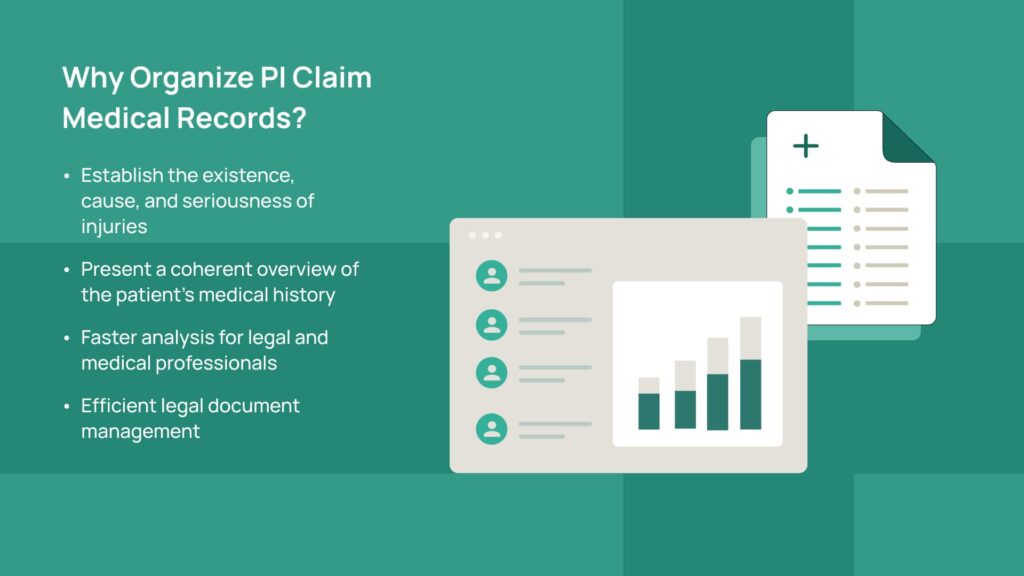One of the most crucial parts of any personal injury case is the medical information and records because PI claims are entirely dependent on what is contained in them. The existence, cause, and seriousness of a victim’s injuries must be established in order for a personal injury claim to be successful. Therefore, maintaining personal injury medical records is essential for any PI firm, regardless of size.
Obtaining, managing, and analyzing medical records can be a difficult task for personal injury law firms because there are typically multiple medical records for each case. This must be taken seriously because there may be consequences if you overlook any pertinent medical information. Ideally, medical records should be arranged in a logical order before being reviewed by a medical expert.
Fortunately, technology can save the day. Using a guided approach, a modern personal injury case management system can assist you in capturing and managing medical records from intake to discovery.
Contents
Why organize personal injury claim medical records?
A typical medical file contains a variety of records, including billing details, patient histories, physician orders, test results, and treatments. Occasionally, there may be so many records in a file that it is difficult to tell one record from another. Therefore, in order to be used effectively, medical records must be well-organized. Organize the documents to support your litigation needs in order to present a coherent overview of the patient’s medical history. This makes analysis simpler for the nurse, lawyer, or expert. It also makes it possible for a lawyer to find information in the record that is pertinent to the injury claim quickly, which ultimately speeds up the preparation and presentation of the case and ensures efficient legal document management.
Here are some ways that CloudLex can efficiently and effectively help organize your personal injury medical records and files:

Personal injury medical records incident information at the intake stage
With the help of the intuitive client intake forms provided by CloudLex’s Intake Manager, you can collect data specific to the type of injury like car accident, dog bite, slip and fall etc.
Obtain as much information about the clients’ medical history as you can when you interview them. If they have billing records, make a copy of them and keep them because they will have the necessary healthcare providers’ contact information.
You can record all the pertinent and important information gathered regarding the incident, injury, and medical treatment using CloudLex’s Intake Manager. Insightful questions guide you through the intake process.
If the plaintiff was treated by a medical professional, note their information as well as the type of care the patient received.
All of this information can be used to assist you in the future when you ask the hospital or other medical service providers for personal injury medical records.
How to organize medical records – plaintiff’s medical information
Attorneys can easily convert the intake process into matter after it is finished, transferring all the information from the intake process, including incident details, with the simple click of a button.
All medical data from intake will be available for you to process the case further through CloudLex’s matter management software. The data gathered during the investigation can then be captured, managed, and tracked. Under the medical information details of a specific matter, you can link document files you requested from service providers to each plaintiff’s medical record.
Medical bills, liens, tests, prescriptions, and doctor’s orders are all included in a medical file. When organized, these medical records and treatment documentation will provide a thorough picture of your medical history and will support your legal case.
With the aid of CloudLex, attorneys can more easily analyze and locate information in the record that is pertinent to personal injury claims, speeding up the preparation and presentation of cases for clients.
Track personal injury medical records request
Personal injury attorneys have to request various medical reports for the plaintiff in a case while managing multiple cases at once.
Depending on the location, type, and size of the service provider, it may take several weeks to process each request. These requests are prone to be lost, having incomplete authorization, and lacking payment information. As a result, paralegals and legal assistants frequently follow up with nursing homes, hospitals, and other service providers in order to compile accurate records. Manual processing runs the risk of losing important medical data and jeopardizing the entire case.
Enter CloudLex; its built-in reports will save you from the struggle of manually tracking the status of medical reports. All of your matters, including treatment types, status, attached documents, service providers, doctors, and other factors, can be tracked and analyzed using medical request reports. In order to maintain law firm communications, keep follow-ups on schedule, and speed up turnaround.
Reports guarantee that you never miss the deadline and spare you the hassle of searching for medical records at the last minute.
Benefits of organizing personal injury medical records
- Quickly reviewing well-organized medical records increases efficiency and helps the lawyer save time and money.
- Documents that may not be relevant to the case can be identified and omitted so that the medical case chronology can be made available at an early stage itself.
- Indexed and well-arranged medical records enable attorneys to better prepare questions for depositions, filing motions, discovery, etc.
- Properly arranged medical records help counsel to read and comprehend the important aspects of the case at hand.
Overall, organized personal injury medical records will offer counsel a better and more precise understanding of the case, which is crucial for presenting the case in court and securing justice for their clients. Organized and complete medical records will save time and money.
3 ways cloudlex helps personal injury firms manage medical records
Generally, there are multiple medical records for each case, and therefore, obtaining, managing, and analyzing the medical records can be a daunting task for personal injury law firms. This needs to be taken seriously as there can be repercussions if you miss any medical detail in the process.
Fortunately, there is technology to save the day. Modern personal injury case management system can help you capture and manage medical records, with a guided approach, right from intake, through to discovery.
However, general case management software built for all legal practice areas cannot manage medical information. Such software mostly doesn’t have built-in medical record features because they are not developed specifically for personal injury, but all practice areas. Often, to provide medical record functionality, generic software is integrated with third-party tools to accommodate personal injury lawyers- a somewhat mismatched approach!
There are two problems with this approach; firstly, if you use third-party tools within your case management software to perform core tasks, then there is a risk of losing information during the exchange. Secondly, additional fees are levied to integrate third-party tools, which are then added to your subscription charges directly or indirectly.
This means you pay additional dollars for the add-on, which is supposed to be a core functionality of the personal injury case management software in the first place.
But not anymore! CloudLex® is built specifically for personal injury lawyers. It focuses on the most essential and relevant functionalities to their practice, creating a practice-focused, frustration-free experience.
Here are three ways CloudLex helps you manage medical records and files seamlessly and effectively.
1. Capture incident details at intake stage
CloudLex’s Intake Manager gives you intuitive intake forms to capture information specific to the injury type.
When you interview the clients, obtain a complete medical history, with as much detail as possible. If they have billing records, copy and retain those, as they will contain relevant contact information for healthcare providers.
CloudLex’s Intake Manager helps you record all the relevant and necessary information obtained related to the incident, injury, and medical treatment. The intuitive process guides you through the intake with insightful questions such as; ‘Whether the injury was claimed?’ and ‘Was the plaintiff taken to a hospital?’ If yes, you’ll be guided to record the hospital information, etc.
If the medical provider treated the plaintiff, then you can record the details of the medical provider and type of treatment the plaintiff received.
All this information can help you request medical records from the hospital or medical service providers at a later stage.
2. Manage plaintiff medical information
Once attorneys complete the intake process, it can then be converted into the matter, transferring all the intake information, including incident details, with just a click of a button.
CloudLex’s Matter Manager will have all medical information from intake ready for you to process the case further.
You can then capture, manage, and track all the information collected during the investigation. Additionally, you can link document files you requested from service providers to each plaintiff’s medical record under the medical information details of a particular matter.
A medical file includes medical bills, liens, tests, treatment, and physician orders. Collectively, all these medical files and documents of the treatments will give a comprehensive view of medical history, and when organized, it supports your litigation process. Therefore, it is essential to organize them effectively.
CloudLex makes it easier for the attorney to analyze and quickly find information in the record relevant to the personal injury claims, which ultimately helps law firms to more rapidly prepare and present the case.
3. Track medical report requests
Personal injury lawyers handle multiple cases at a time and have to make various medical report requests for the plaintiff in a case.
Turnaround of each request varies based on location, type, size of the service provider, and can take several weeks on average. Moreover, these requests can easily be misplaced, can have the incomplete authorization, and missing payment details.
Therefore, to gather accurate records, paralegals/ legal assistants regularly have to follow-up with nursing homes, medical service providers, etc. If done manually, you can risk losing crucial medical information and put the entire case in jeopardy.
Enter CloudLex; its built-in reports can rescue you from the struggle of tracking medical report status manually. You can run medical request reports of all your matters to track and analyze; treatment types, status, linked documents, service providers, physicians, and so on. So that everyone stays informed, and follow-ups on track, helping you shorten turnaround time.
Reports also save you from the last-minute hassle of finding medical records and ensure that you never miss the deadline.
Speaking of deadlines, request a demo with our cloud consultant today and learn more about our all-in-one cloud-based personal injury software designed to meet all your personal injury needs—especially if those needs include secure and efficient medical record management.
Disclaimer: All product names, logos, and brands are the property of their respective owners. All company, product, and service names used in this document are for identification purposes only. The use of these names, logos, and brands does not imply endorsement. We disclaim proprietary interest in the marks and names of others. Any views expressed in this document represent the beliefs and opinions of CloudLex, whose analysis is based solely on publicly available information. No representation or warranty, express or implied, is made as to the accuracy or completeness of any information contained herein. CloudLex expressly disclaims any and all liability based, in whole or in part, on such information, any errors therein or omissions therefrom. CloudLex also reserves the right to modify or change its views or conclusions at any time in the future without notice.

